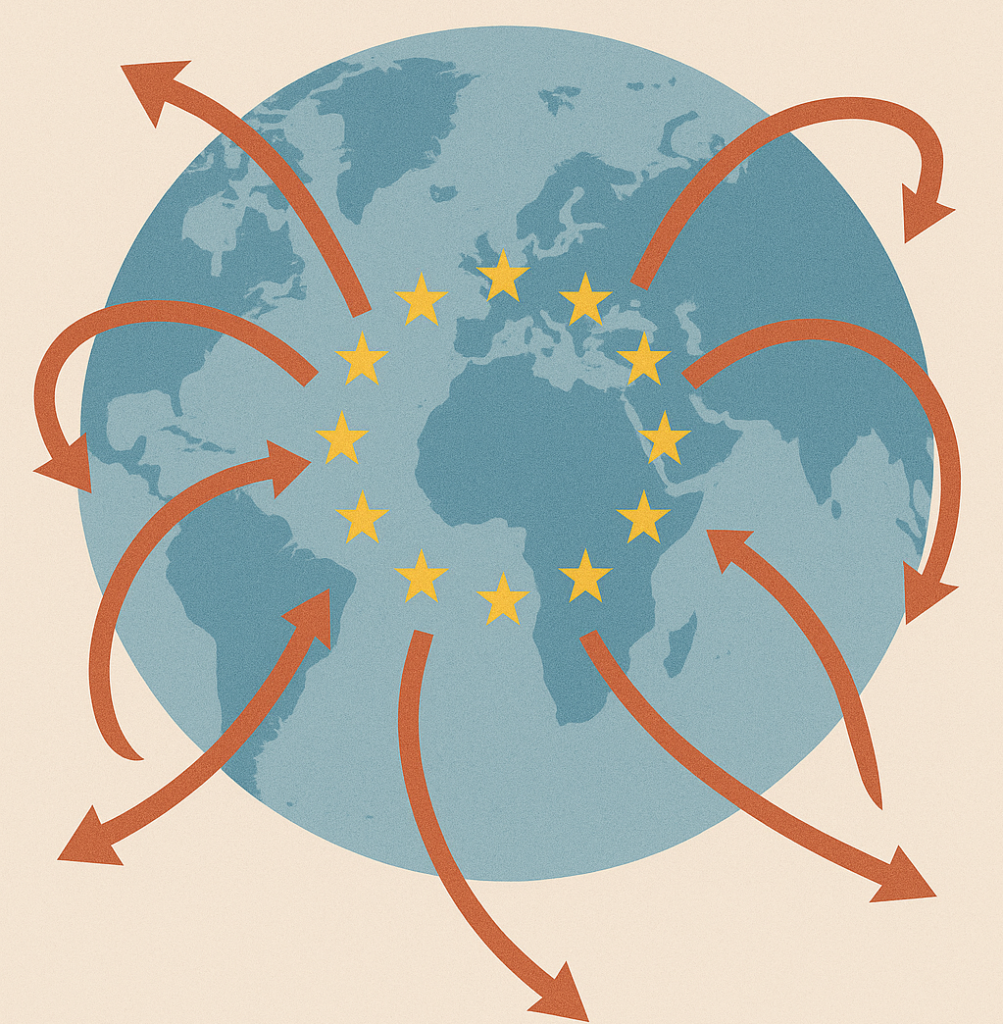[FR] Europe must promote a new form of multilateralism

Multilateralism may have originated on the European continent in the aftermath of two world wars, but its inspiration came from across the Atlantic and from the vision and commitment of US President Woodrow Wilson, who sought to put an end to the historical approach of the “balance of power” with its undeclared pacts and alliances.
Within this new Western framework, Europe sought to formulate its own model. The founding fathers of the European Community had the creativity and vision to propose a completely different project: a political project with a clear desire to put an end to successive conflicts and wars and to base this entire vision on a process of gradual integration. ‘Europe will not be made all at once,’ Robert Schuman declared in his famous statement on 9 May 1950. It was a form of multilateralism with greater ambition and clear objectives: to guarantee peace and promote prosperity and development. And within a limited geographical framework, with a not too large number of countries.
Obviously, we had to rely on another form of multilateralism that could ensure the regional development of our political model. Thus, the United Nations was to be the guarantor of our peace and global security. Europeans would participate, with their community, in creating a region of stability and security, which would facilitate global peace in the world.
The greatest paradox is that during the first few decades, this new organisation, which later became the European Union, did not pay much attention to foreign policy. Each of its members maintained its own diplomacy, but there was no European foreign policy. Our successful regionalisation served as a reference for other attempts around the world (Mercosur, ASEAN, etc.) as a way of integrating economic and financial policies and the free movement of capital, people and goods, but the major strategic issues remained in the hands of the nation states, which still exercised their authority to engage in international debates and disputes.
A few signs pointing to the need for a common European policy, such as the 1973 crisis, the Single European Act (1986) and the Venice Declaration (1) (1980), demonstrated the need for an independent EU policy. However, it was not until the Maastricht Treaty (1992), the Amsterdam Treaty (1997), the Nice Treaty (2000) and finally the Lisbon Treaty (2007) that the new external policy of the Union was given a raison d’être.
Throughout these recent stages, Europe has been an essential pillar of multilateralism. For reasons of survival, during the East-West division of the American-Soviet bipolarity, or during the Pax Americana as a counterweight to American hyperpower, the European Union has always defended the role and importance of developing effective multilateralism.
We are familiar with the heated discussions on participating in the reform of the United Nations and the proposals to achieve new representation on the Security Council with a single seat for the European Union. The Constitutional Treaty (2004) was the beginning of this approach, which the national interests of the European countries, permanent members of the Council, were not yet ready to adopt. The debate was postponed and it will be difficult to resume it, given that France is now the only EU country represented among the five permanent members.
In any case, the European Union, which had to wait until 2010 to be admitted as an observer to the UN, has always been very active in developing a multilateral policy on major global issues. The EU is the main contributor to the UN budget, providing 40% of it through contributions from its Member States.
This multilateral vocation of the European Union is now more evident than ever, given the new European and international context. We are facing a new stage in European integration and, at the same time, we know that the multilateral system must be strengthened in order to respond to current challenges.
The post-war system, born out of the San Francisco Charter and Bretton Woods, no longer responds to today’s world. The problems of our century require more multilateralism, but a different kind of multilateralism, one that is more representative and more effective. Globalisation has become an unavoidable reality. No one can doubt that, but its effects and consequences have created a sense of failure and inequality. This has led to a retreat into isolationism. Populism feeds on this feeling of dismay, which has affected a large part of humanity.
Europe, with its model of integration, can be the first to respond negatively to this dehumanised globalisation. The world of the future will be shaped by global governance, but this will require the establishment of large regional areas that can integrate more easily into the global system. Whether in South-East Asia or on the American continent, everything indicates that the economy and trade will mainly take place in the north-south regions, which will be able to develop more easily around this type of integration.
Europe is at the forefront of these integration phenomena. Our vision and the achievements of our project remain an essential reference point. But our past success obliges us above all to mobilise to continue our political project. The European Union must choose the new path to consolidate its future as soon as possible.
At the same time, the world is facing profound changes and new power relations are being established. The Trump administration is announcing “America first” with a gradual disengagement of the United States and a questioning of several agreements that are essential for peace and the future of humanity, as was recently the case with Iran. Faced with this new US policy, the European Union must finally define its own policy and achieve the psychological maturity necessary to defend its interests, without having to consult or receive constant approval from the other side of the Atlantic.
But how can this be done? Strengthening multilateralism is the best answer. Faced with the announcement of a new G2: the United States and China, Europe must redefine the multilateral framework and, in a spirit of shared responsibility, guarantee a place in it for all international players who want to exert their own influence and hegemony. But to do so, the multilateral system must be strengthened.
France and Europe have shown the way: at COP 21 in Paris in December 2015, multilateralism received a new impetus. The success of this summit in Paris must undoubtedly be attributed to the wisdom and expertise of French and UN diplomacy, but above all to the new approach adopted to achieve an exceptional result.
Political leaders understood the new challenges. Diplomats and representatives of nation states were needed. Political commitment and support from governments was required. But that was not enough. A favourable environment had to be created to put pressure on states. The media and civil society were absolutely indispensable, right up to Pope Francis. It was necessary to create a sense of a historic moment. It was also necessary to involve the private sector. Businesses were in favour of this new paradigm; if capital was in favour of the fight against climate change, we were sure to win the battle. Everyone played their part and we all won.
This is the model and the role of the European Union in building a new multilateralism, where states, civil society, NGOs, the private sector, the media, trade unions and citizens work together. Everyone wants to participate in this new multilateralism in one way or another. This is the direction the United Nations must take.
We now have a new agenda: Agenda 2030, the Sustainable Development Goals. The seventeen Sustainable Development Goals (SDGs) must be part of the European Union’s new paradigms. This is the agenda for the future. That is why Europe should propose convening a summit in 2020 to relaunch the implementation of this agenda. Brussels, Paris, Berlin or another European capital should take over to continue strengthening this new multilateralism. The Paris Peace Forum, which President Macron wants to convene on the centenary of the end of the First World War on 11 November, should serve as the starting point for a cycle of reflection and projects for a new multilateralism.




